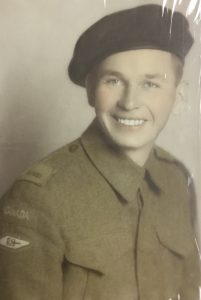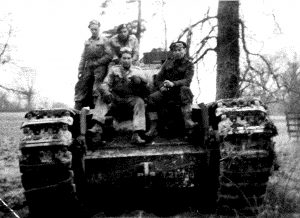Trooper Jesse Moses, Delaware band, Six Nations of the Grand River Territory, and Ontario Regiment (Tank)
Introduced by John Moses (Six Nations of the Grand River Territory) – Canadian Museum of History
Prepared for this blog by Dr Kate Rennard (Kent) – Research Associate, ‘Beyond the Spectacle’
To commemorate Remembrance Day 2019, ‘Beyond the Spectacle’ is again highlighting Indigenous North American experiences in Britain during wartime. Last year, we profiled several servicemen and women from the First World War. This year, we focus on Jesse Moses (Six Nations), who served in the Canadian Army during World War 2. We’re particularly grateful to John Moses, his cousin, for allowing us to share some of Jesse Moses’s letters home and for writing an introduction to them. These selections illustrate not only Moses’s observations on life in Britain, from the weather to the problems with British roads, but also his experiences of wartime here. Through all of these, as his letters show, he maintained his sense of humour.
Trooper Jesse Moses, Delaware band, Six Nations of the Grand River Territory, and Ontario Regiment (Tank), during the Second World War

I am privileged to write these lines concerning the Second World War service record of my relative, Jesse Moses. A member of the small Munsee-Mahican band of Delaware (Lenape) at the Six Nations of the Grand River Territory near Brantford, Ontario, Canada, Jesse was a first cousin to my own late father Russ and thus a second cousin to myself. However, given the age difference and cultural practices in our extended family, I always considered him more of an uncle than a cousin.
Following initial training in Canada and the U.K. including in Scotland, Trooper Jesse Moses fought with his unit, the Ontario Regiment (Tank), throughout the Sicilian and Italian campaigns, and later Northwest Europe including the liberation of Belgium and Holland. His letters home to his betrothed, Olive, span July 2, 1941 to September 24, 1945, beginning in England and ending in Holland. Apparently always strictly adhering to wartime censorship rules, Jesse’s letters are nearly bereft of any technical or operational details of interest to the military historian, but this is understandable given his recipient and their relationship: he wanted to encourage and support Olive during their forced separation, and not to worry her. Nevertheless, the letters and a handful of photographs do provide a snapshot of the daily round, and the thoughts and feelings of a young Indigenous serviceman from Canada, in the thick of things during wartime.
Jesse’s letters home and other wartime ephemera to which I have fallen heir also bear witness in microcosm to the military service tradition of the Six Nations Confederacy of Iroquois (Haudenosaunee) and other allied First Nations in support of the Crown, recalling a political relationship dating from earliest colonial encounters that still endures today in the spirit and intent of the Covenant Chain wampum belt: mutually beneficial diplomatic relations in peace, and military alliance during war. Many Six Nations individuals and extended families were willing to support the notion of a strong and united Dominion and Commonwealth, so long as these same entities respected Indigenous and treaty rights in return.
Finally, it is important to note that Jesse himself was but one member of the Six Nations of the Grand River community, and but one member of the extended Moses family at Six Nations, who supported Allied efforts in the two World Wars and Korea. Others continue the military service tradition today. The story of each merits a re-telling in its own right.
John Moses
Selections from Jesse Moses’s letters to Olive Hill, while he was stationed in England, July 1941-July 1943.1
England, July 2, 1941.
This letter is coming from somewhere in England, and I mean somewhere, because if they turned me loose, I wouldn’t know which way to go to get out. This is our third day in England, that is since we landed. We have been in two countries though, England and Scotland.…Most likely you have read about these old castles. We passed about six of them on our train ride from Scotland to England. One we passed, they say was over five hundred years old. I wish you could see the trains they have over here. The boys got a kick out of them because they are so small. One fellow went so far as to say the toy train his father bought him was as big. Boy, you ought to see them go. They are off in a cloud of dust….
August 14, 1941
I have been all over the camp trying to borrow a pen, but was unable to get one. They have some here in the canteen, but they scratch like the dickens. This day is the first fair day we have had since last week. Boy, is it ever a pleasure to feel the sunshine once in a while.
We received mail yesterday. You don’t know how a guy really feels when he gets a letter from home. There is nothing like it to keep a guy’s spirits up.
On Sunday, some of us were on a forty-eight hour pass. I didn’t get back until four o’clock Monday morning. We were at a little town about eight miles from camp, and we had to walk home. Hitch-hiking is very different to what it is in Canada. There is seldom a car on the road after twelve, and they travel without lights.
When we go driving trucks, we have to watch because the roads are so narrow. I guess they make their cars according to the roads, for there is hardly enough room for one person. If they had cars like yours over here, they would scrape fenders when they pass….
August 22, 1941
Yesterday, we went on a loading scheme. We went down to the station to learn how to load tanks on a train. They have a lot of these stone walls along roads over here. Now they have one less. I don’t know what happened, but when we came along, there was the greater portion of the wall spread over the road. The major told us that one tank tried to scale the wall. As far as the tank was concerned, it just had a little paint scraped off.

August 18, 1942
Just finished dinner – potatoes, roast beef, green peas and gravy – sounds appetizing, eh? Maybe it would be if it was cooked right. But you have to eat it whether you like it or not…
We just came back off a scheme which lasted a week. Tomorrow we are pulling out again for a couple more weeks. We are supposed to be going to the ranges – practice shooting again. This is the first time since we were in Wales last fall. All I hope is that it doesn’t rain all the time we’re up there. They never got all the mud out of the radiator till about a month ago. Sometimes we were in mud and water halfway up the tank….
We are having quite a few air raids now. The sirens go two or three times a night and the early hours of the morning.
One night we were out loading tanks on barges. Some of Jerries boys were over. They dropped some flares and it lit up the place like day. The best part was when the old ack-ack guns started spitting. To see all those tracer bullets going up gives you quite a display of fireworks – the kind you pay six bits at the Exhibition to see. We were right in the center where the guns were firing. It sure gives you a funny feeling down your spine. All that was missing was the bombs.
April 8, 1943
Here it is nearly the middle of April and this will be exactly three letters since the first of the year. I know it doesn’t sound like very many but we have had exactly one Sunday off in the past two months and a half. By that you can see we are kind of hitting the high spots.
For two weeks we were out on a scheme – seeing England in the black of night and through a periscope. I never did anything in my life, that I can remember, as hard as driving at night without any lights. All you have to follow is only a spot of red from the vehicle in front of you. We had lovely weather though. It didn’t rain a drop, but it got awfully chilly at night.
The worst of all is just getting into bed, and some of the big shots yell “Everybody out.” Not only that, but after they get you out of bed you sit along a road for four or five hours. That’s when you feel the cold….It’s not half bad though. It’s the first time we hit this country that we have beds to sleep in. It’s a wonder I don’t roll out. The billets are great, hot water heated….
Soon after this, Jesse Moses was posted to Italy. He eventually left the Army in January 1946 and returned to farming. Commenting on his experiences to a newspaper in 1998, he remarked: “How much can you see out of a tank periscope? We had good and bad times. I don’t think about it much.”2 Even though he later downplayed his experiences, his letters to Olive provide us with a remarkable insight into his service in Britain during the Second World War.
1 Jesse Moses’s letters and photographs appear courtesy of John Moses.
2 Michelle Ruby, “Posters raise profile of rank-and-file veterans,” The Expositor, 20 October 1998, A7. Courtesy of John Moses.

Nia:wen to Dr. Kate Rennard and the Beyond the Spectacle project for this opportunity to build Indigenous awareness and provide an Indigenous perspective concerning Indigenous contributions to Canada’s and the Commonwealth’s military heritage. Indigenous military service was contentious, and fraught with unanticipated outcomes. Military service during the two World Wars was the occasion of the greatest concentrations of Indigenous peoples in the UK and on the Continent.